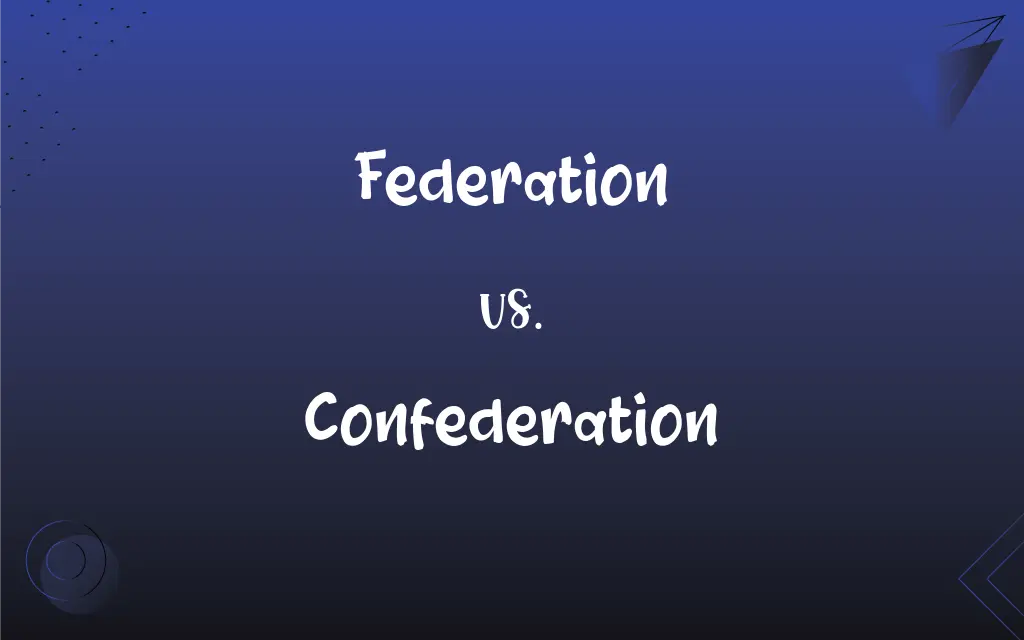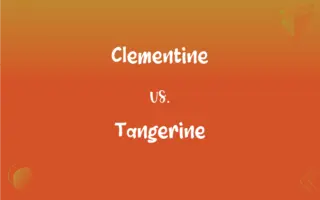Federation vs. Confederation: What's the Difference?
Edited by Janet White || By Harlon Moss || Updated on October 11, 2023
A federation is a union of entities under a central government, while a confederation is an alliance of independent states cooperating in matters of common interest with a weak central authority.

Key Differences
A federation typically embodies a political entity where subunits (like states or provinces) and a central government share authority under a single constitutional framework. The distribution of power, rights, and responsibilities between the central and local authorities is clearly defined and generally inflexible. In contrast, a confederation often refers to a union where member states, provinces, or entities retain most of their independence and delegate only a few powers to a central authority, often concerning matters of common interest like defense or foreign affairs.
In a federation, the central authority usually has the power to make decisions that bind all member entities and has the legal authority to enforce its decisions. The individual entities may have their own laws and practices, but these cannot contravene the constitution or laws of the federation. In opposition, in a confederation, the central authority typically cannot create laws that directly affect the member entities without their consent. Member entities, in this instance, hold the ultimate power and can act independently of the agreed-upon collective decisions if they choose.
In terms of the creation or alteration of primary governing documents, a federation’s constitution usually outlines a specific and often rigorous process for amendments, ensuring the stability and longevity of the established system. Conversely, a confederation might operate on a more flexible system, where agreements or treaties between member entities can be altered or abandoned with comparative ease, potentially reflecting the looser, more cooperative nature of the union.
While federations often have stronger, more empowered central authorities, their creation is usually intended to establish a permanent union with an aim for political stability and uniformity in specific areas like defense, foreign policy, and monetary policy. Confederations, alternatively, often arise from a desire to cooperate on certain matters while maintaining substantial sovereignty and independence. The connection in a confederation is generally more fluid, potentially allowing members to leave more easily than they could in a federation.
In international relations, a federation can act as a singular entity, making decisions, forming alliances, and establishing laws that are applicable and enforceable across all member states or provinces. On the flip side, in a confederation, while the collective body may engage in international relations, the agreements or treaties formed are generally non-binding, and independent entities might conduct their own foreign relations independently of the collective stance.
ADVERTISEMENT
Comparison Chart
Power Distribution
Central authority has significant power
Central authority has limited power
Member Autonomy
Members have limited sovereignty
Members retain strong sovereignty
Constitutional Rigidity
Constitution is usually rigid and hard to amend
Agreements may be more easily amended
Union Permanence
Intended as a stable, enduring union
Often forms a more temporary, flexible alliance
Foreign Relations
Conducts unified, binding foreign relations
Foreign relations may be non-binding or varied
ADVERTISEMENT
Federation and Confederation Definitions
Federation
A union providing for shared governance between central and local entities.
In the federation, states relinquish certain powers to the central authority.
Confederation
A union where sovereignty is predominantly retained by member entities.
Even within the confederation, each state maintained its independent legal system.
Federation
A structure with a permanent intent to unify distinct entities.
The federation was formed to provide a stable framework for mutual development.
Confederation
A loose alliance, often with a weak central authority.
The central authority in the confederation had limited power over member states.
Federation
An entity with a constitution prescribing governance and law.
The federation enforces laws that are uniformly applicable to all member states.
Confederation
An organization where amendments or exits might be relatively straightforward.
One member decided to leave the confederation after a disagreement on trade policies.
Federation
A political entity combining subunits under a central authority.
The United States is a federation with states governed under a federal constitution.
Confederation
A political entity which may not present a unified front in international relations.
Despite the confederation’s stance, one member state pursued its own foreign policy.
Federation
A political system with central authority over foreign relations.
The federation engages in international diplomacy as a single representative entity.
Confederation
A union of independent states or entities for collective action.
The confederation was formed to coordinate defense efforts among its members.
Federation
The act of federating, especially a joining together of states into a league or federal union.
Confederation
The act of forming into or becoming part of a confederacy.
Federation
A league or association formed by federating, especially a government or political body established through federal union.
FAQs
How does confederation central authority differ?
In a confederation, the central authority typically has considerably less power than constituent units.
What about constitutional flexibility in a confederation?
Confederations tend to have more flexible agreements that can be easier to amend.
Can a federation's constitution be easily amended?
No, generally, a federation’s constitution is rigid and requires a specific process for amendments.
How does a federation represent itself internationally?
A federation usually engages in foreign affairs as a single, unified entity.
What is a key feature of a federation?
A federation has a strong central authority with powers over its constituent units.
Is the central authority in a confederation powerful?
Generally, no – it tends to have limited powers, particularly over member entities.
What is a key reason for forming a federation?
Often, to provide stability, unity, and coherent governance across multiple entities.
Are the laws uniform across all entities within a federation?
Yes, federal laws apply uniformly, though entities can have their own laws in certain areas.
Can states in a federation establish their own foreign policies?
Typically, no – foreign policy in a federation is usually centralized.
What is the typical role of a central government in a federation?
It governs according to a constitution, enforcing laws and policies across all entities.
Can a confederation member conduct its own foreign policy?
Yes, members of a confederation can often conduct independent foreign relations.
Do confederation-wide agreements automatically apply to all members?
Not necessarily; agreements might be non-binding, depending on the confederation’s structure.
Can entities within a federation freely secede?
Generally, no – secession is typically not permitted under a federation’s constitution.
How easy is it for members to leave a confederation?
Often easier than in a federation, as confederations are typically looser unions.
Are federations typically larger than confederations?
Not necessarily – size can vary significantly in both federations and confederations.
Is a confederation intended to be a temporary alliance?
Not always, but confederations are generally more flexible and may be more temporary.
How are defense matters typically handled in a confederation?
Defense might be coordinated collectively, but members might maintain their own defense strategies.
Why might entities form a confederation instead of a federation?
To cooperate on certain issues while retaining substantial autonomy and independence.
Is the formation of a federation intended to be permanent?
Yes, federations are typically formed with the intention of creating a stable, lasting union.
Can a confederation become a federation?
Yes, a confederation might evolve into a federation if members agree to centralize more authority.
About Author
Written by
Harlon MossHarlon is a seasoned quality moderator and accomplished content writer for Difference Wiki. An alumnus of the prestigious University of California, he earned his degree in Computer Science. Leveraging his academic background, Harlon brings a meticulous and informed perspective to his work, ensuring content accuracy and excellence.
Edited by
Janet WhiteJanet White has been an esteemed writer and blogger for Difference Wiki. Holding a Master's degree in Science and Medical Journalism from the prestigious Boston University, she has consistently demonstrated her expertise and passion for her field. When she's not immersed in her work, Janet relishes her time exercising, delving into a good book, and cherishing moments with friends and family.
































































